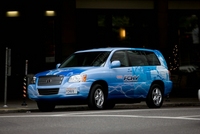In-Depth Look at Toyota Fuel Cell Hybrid Vehicle Technology - GREAT VIDEO
Toward achieving a world of sustainable mobility in which methods of travel coexist in harmony with people and Earth we have put particular effort into our core business of making automobiles. Our challenge has been to create an "ultimate eco-car" that will make sustainable mobility a reality.
In December 2002, Toyota Motor Corporation began limited marketing of the hydrogen-powered TOYOTA FCHV (fuel cell hybrid vehicle) in the United States and Japan. Considered to be the closest thing yet to the ultimate eco-car, the TOYOTA FCHV was developed using Toyota's original hybrid technology derived from the Prius, the world's first mass-produced hybrid vehicle as its core technology.
As R&D on the TOYOTA FCHV continues, the technology that drives it is accelerating toward widespread use. At the same time, we are exploring the potential of a wide range of power sources¯including not only hydrogen, but also gasoline, diesel, electricity and alternative fuels¯while considering what the optimum eco-car would be for the energy situation, infrastructure and regulations in each country.
These considerations are all based on Toyota's concept of providing "the right car", "in the right place", "at the right time".
Click PLAY to watch video
On August 6, 2009, Toyota Motor Sales, U.S.A., Inc., announced the results of a recent collaborative fuel cell hybrid vehicle range and fuel economy field evaluation. The Toyota Highlander Fuel Cell Hybrid Vehicle – Advanced (FCHV-adv) achieved an estimated range of 431 miles on a single full tank of compressed hydrogen gas, and an average fuel economy of 68.3 miles/kg (approximate mpg equivalent) during a day-long trip down the southern California coast.
In mid-2008, the U.S. Department of Energy (DOE), Savannah River National Laboratory (SNRL) and the National Renewable Energy Laboratory (NREL), approached Toyota to participate in a collaborative evaluation of the real world driving range of the FCHV-adv. On Tuesday, June 30, two fuel cell vehicles, two Toyota Technical Center engineers, an SRNL engineer and a NREL engineer completed a 331.5 mile extended round trip drive between Torrance, California and San Diego.
“This evaluation of the FCHV-adv demonstrates not only the rapid advances in fuel cell technology, but also the viability of this technology for the future,” said Jared Farnsworth, Toyota Technical Center advanced powertrain engineer.
The drive began at TMS headquarters in Torrance, traveled north to Santa Monica, turned south to San Diego and finally retraced the route back to Torrance. The route encompassed a variety of drive cycles, including high speed highway driving, moderate highway driving and stop and go traffic on surface streets, in an effort to capture a typical commute. Each vehicle was outfitted with a data collection system that captured vehicle speed, distance traveled, hydrogen consumed, hydrogen tank pressure, temperature and internal tank volume.
Driving range data from each vehicle was calculated by SRNL and NREL engineers. The results were averaged for an estimated range of 431 miles, with an average fuel economy of 68.3 miles/kg.
For comparison, the 2009 Toyota Highland Hybrid achieves an EPA-estimated rating of 26 mpg combined fuel economy and has a full-tank range of approximately 450 miles. With premium grade gasoline currently priced at about $3.25, the gasoline-powered V6 Highlander hybrid is estimated to travel approximately 26 miles at a cost of about $3.25. Currently, hydrogen gas pricing is not fixed, but DOE targets future pricing at $2 to $3 per kilogram. Therefore, the FCHV-adv is estimated to travel approximately 68 miles at a projected cost of about $2.50 - more than double the range of the Highlander Hybrid, at equal or lesser cost, while producing zero emissions.
SRNL and NREL analyzed all data gathered during the evaluation and prepared a formal report to DOE verifying range results and miles per kilogram achieved. This report will assist regulators and government research programs to accurately assess the status of the fuel cell industry and viability of the current technology.
“Toyota’s hydrogen fuel cell technology has advanced rapidly over the last two years,” said Irv Miller, TMS group vice president, environmental and public affairs. “In 2015, our plan is to bring to market a reliable and durable fuel cell vehicle with exceptional fuel economy and zero emissions, at an affordable price.”



